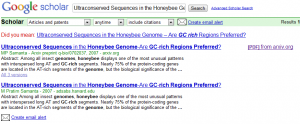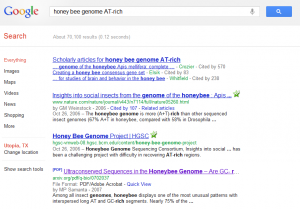
Does Citation-index Count in the Era of Google?
For new readers, easiest way to follow us is through our twitter feed. The feed is updated, whenever we post a commentary here.
In late 2006, we were working on the honey bee genome paper and I noticed an interesting pattern in the AT-rich and GC-rich parts of the genome. So, I wrote up a short commentary and tried to get a few ‘experts’ excited about my findings. However, based on their reaction, I gave up any thought of publishing it in a regular journal. I did not have any doubt about the merits of the findings. However, at that time, we were working on several Science and Nature papers (all published now), and few other papers in ‘lesser’ journals. I could not take the headache of another round of arguments with editors, anonymous reviewers, resubmission and so on.
At that point, I thought of trying out an experiment. I wrote up what I had and ‘published’ it at arxiv.org.
Most biologists never heard of arxiv.org, but those coming from physics background are well familiar with the online repository. It has been up and running for over a decade now, and physicists often submit their papers there before sending it to a regular journal. At times, they choose to forego the later step.
Submission to arxiv.org is very easy. You do your own writing, proof-reading, editing and then click the send button. Moments later, your paper appears online, and the whole world sees your work. There is no editor, reviewer or other steps. When we were graduate students, the biggest obstacle used to be pre-formatting the papers in Latex editor. Even those troubles are gone now, and it is so easy to use, my mama can publish the science behind her tandoori chicken recipe.
Would it not be a disaster, if the journal has no editor or reviewer? Not really, or at least arxiv.org did not turn out to be useless over the last 15 years. The physicists argued that if a arxiv.org paper had any merit, it would be cited by other arxiv.org and non-arxiv.org papers. That process of citation would bring attention to good arxiv.org papers.
In the bigger context of internet, Google uses the same principles display the most relevant web-sites for any search words. You are free to write anything and post online, but if your website is useless, not many people will read it and even fewer will link to it. Internet did not turn out to be a complete failure, and nor did arxiv.org.
So, how did my little experiment fare? Please take a look at the following images (click on them to see on large screen).
I first checked google scholar and found out that my paper did not receive any citation. It was a complete failure in the conventional sense. On the other hand, I did not expect any citation in traditional journals, because biologists do not tend to cite what appears to be online links.

Curiously, when I used regular google and searched ‘honey bee genome AT-rich’, my paper showed up right at third after our genome paper in Nature and Baylor’s website. Two links above me should be on the top, given that one contains a highly cited genome paper and the other link has the sequenced genome. However, being at third is something I did not fancy. Did no important person notice that the honey bee genome is AT-rich, or had something interesting to say about it?

To make sure I am not choosing the search keywords that prove my point, I tried few other options - ‘honey bee ultraconserved’ (mine was at top), ‘nasonia genome AT-rich’ (right at top even before the genome paper or sequencing center), ‘honey bee genome nucleotide content’ (within the top few), etc. The results were puzzling and let me explain why.
I did not mention about my observation on honey bee genome or my little arxiv.org submission experiment to anyone since 2007, and even forgot about it myself until the last evening. It was not as if I was going around conferences discussing that work, or telling everyone else to cite or link to it. Nonetheless, somehow google remembered what I had been up to even better than I did.
Did my experiment fail completely (because nobody cited my work), or was successful (because everyone searches google for finding information on any topic)? What do you think?